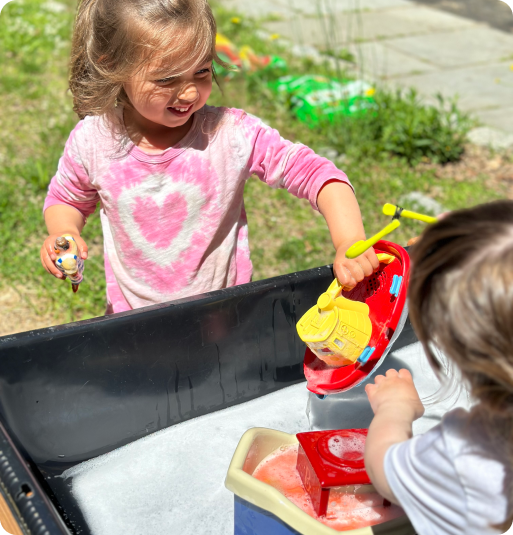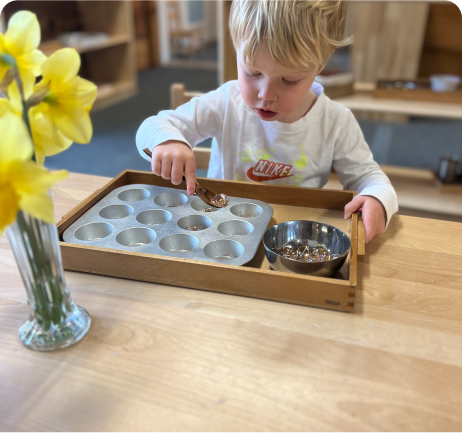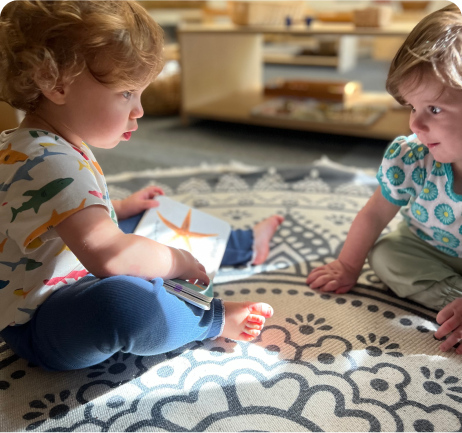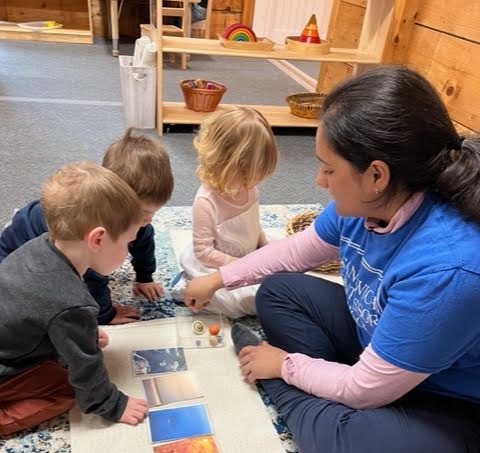Carriage House
at Sandwich
This holistic toddlers program at Sandwich Montessori School nurtures independence, confidence, and exploration in a thoughtfully designed Montessori environment.
The Carriage House Program enrollment is closed for the 2025-26 school year.
We welcome you to visit and pre-register for summer and fall 2026 enrollment opportunities!
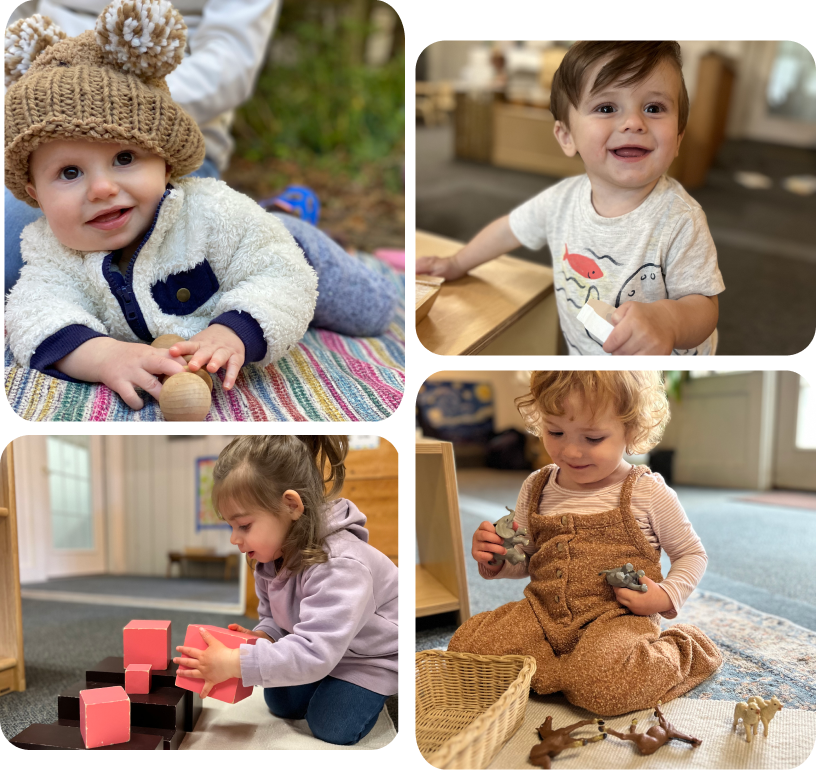
Explore the Program
Visit the campus or request more information
Carriage House for Ages 0-3
At The Carriage House, we embrace the spirited “No!” of toddlers and twos as a powerful declaration of autonomy and the starting point for incredible growth. This pivotal stage of early childhood is a time of transformation, where children move from asserting their independence to mastering new skills, exploring their world, and building a sense of competence and confidence.
Our holistic toddler program is thoughtfully designed to support this remarkable journey. In a carefully prepared Montessori environment, children are encouraged to explore, make choices, and engage with activities that inspire their natural curiosity. With nurturing guidance, they develop independence, refine motor skills, and build meaningful social connections, all while gaining the foundational tools for lifelong learning and problem-solving.
The Carriage House provides a safe and enriching space where toddlers can thrive as they navigate the world with growing confidence and joy. We can’t wait to welcome you and your child to this extraordinary chapter of discovery and development.
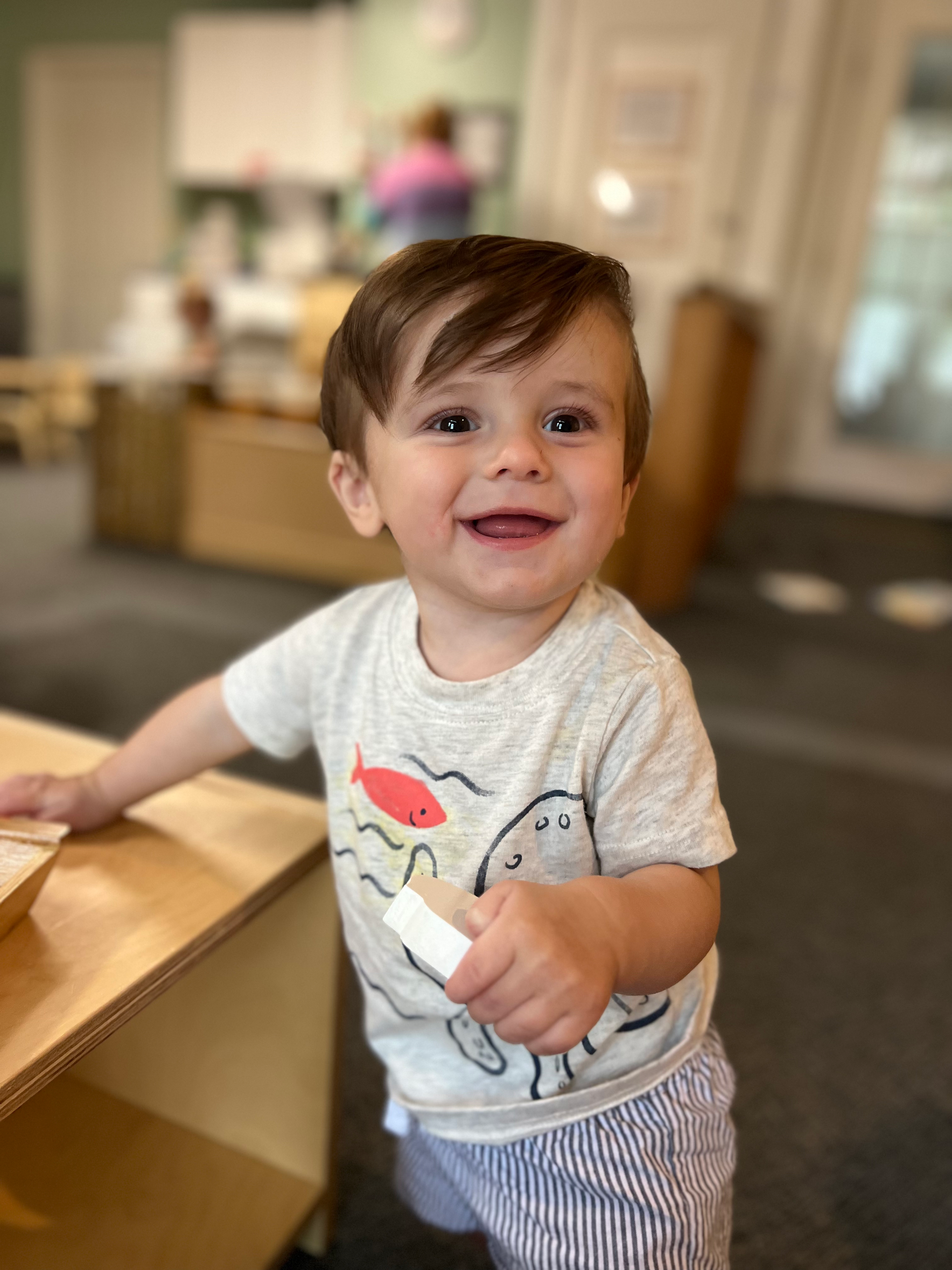
Carriage House Curriculum
Language Development
In the 0-3 community, language development is nurtured through a wide range of activities that engage children in communication and self-expression. From early exposure to spoken language in conversations, songs, and stories, to interactive experiences with music and movement, children are immersed in a language-rich environment. The Montessori toddler classroom supports early language development by methodically introducing toddlers to vocabulary they will need daily, reducing frustration as they learn to express their needs and preferences. In this rich language environment, children hear precise and varied vocabulary through conversations, songs, and read-aloud books that feature poetry, real stories, and beautiful illustrations.
Language development in the 0-3 community also lays an early foundation for literacy, building vocabulary and phonological awareness through oral and auditory interactions. Educators also model reading behaviors and non-verbal cues, supporting the child’s understanding of language as a whole system. This thoughtful approach to language learning lays the groundwork for literacy, preparing children for reading and writing as they progress to the Children’s House.
In addition to spoken language, children are exposed to music, rhythm, and art as methods of non-verbal self-expression. These activities promote communication and help children convey emotions and ideas visually.
Psycho-Sensory Motor (PSM)
The Psycho-Sensory Motor curriculum integrates sensory and physical development through activities designed to refine children’s senses and support motor coordination. Visual, tactile, and auditory stimuli provide sensory experiences that strengthen the mind-body connection. Tasks that require hand-eye coordination, such as sorting or building, help develop fine motor skills, while gross motor activities, like balancing, climbing, and walking, promote body control and equilibrium. Indoor and outdoor activities, including singing, dancing, and tricycle riding, foster a joy in movement and encourage gross motor skills.
Through these experiences, toddlers build cognitive skills as they explore cause and effect, solve problems, make choices, and pursue goals. Each activity is matched to the child’s development, reinforcing their confidence in problem-solving and overcoming challenges. From sorting and matching to opening latches and setting tables, toddlers engage in increasingly complex activities that develop their ability to coordinate movement, make choices, and achieve mastery.
Practical Life
Practical Life activities are central to the toddler’s sense of independence, confidence, and responsibility. Toddlers are naturally drawn to adult tasks, and the Montessori toddler community provides real tools and opportunities to support this interest. Children practice self-care skills, such as dressing, washing hands, and brushing their hair. In the classroom, child-sized furniture and tools are accessible, empowering children to perform purposeful tasks independently.
Children also learn care of the environment by watering plants, polishing mirrors, and washing dishes, which fosters respect for their surroundings and their role within the community. Lessons in Grace and Courtesy help toddlers navigate social interactions by modeling positive behavior, teaching respect for others, and encouraging cooperation. During mealtime and food preparation, children learn to pour, serve, and clean up after themselves, developing fine motor skills, responsibility, and social awareness.
Social and Emotional Development / Grace and Courtesy
Social and emotional growth is a key focus in the Montessori environment, where toddlers learn to identify and express their feelings, understand the impact of their actions, and communicate appropriately. Through specific Grace and Courtesy lessons, children observe courteous interactions modeled by adults and imitate these behaviors. This approach encourages a positive social experience and builds confidence in navigating the classroom community. Socialization is supported by the mixed-age setting, where younger children observe and learn from older peers. Grace and Courtesy lessons help children internalize social norms, fostering consideration and empathy as they grow.
Carriage House Faculty, 0-3 Program

Kelsey Chand
Teacher Leader

Amanda McKee
Teacher Leader

Sarena Byrne
Teaching Partner

Isabella Mawhinney
Teaching Partner
Recent Stories from Sandwich
The Guiding Principles At Sandwich Montessori
We guide children to be kinder, braver, and stronger, equipping them with empathy and courage to make a difference in the world.
We empower kids to lead by example, take responsibility, and support their peers, building leadership skills that start in the classroom.
Our students learn the value of teamwork and respect, understanding how their actions can positively impact their community.
At SMS, we encourage children to explore their passions through hands-on learning, fostering a love for knowledge that goes beyond the classroom.
We nurture curiosity by encouraging kids to ask questions, think critically, and engage in meaningful conversations.
We blend classical education with Montessori principles, inspiring children to think deeply and connect with the world through timeless ideas.
Nature is central to learning at SMS. We integrate outdoor experiences to help children connect with and learn from the natural world.
